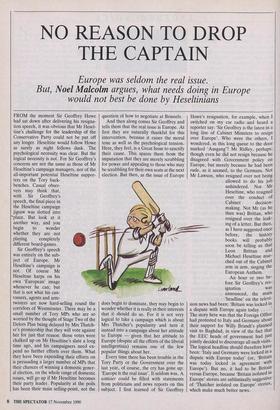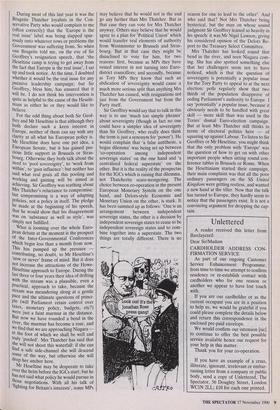NO REASON TO DROP THE CAPTAIN
Europe was seldom the real issue.
But, Noel Malcolm argues, what needs doing in Europe
would not best be done by Heseltinians
FROM the moment Sir Geoffrey Howe had sat down after delivering his resigna- tion speech, it was obvious that Mr Hesel- tine's challenge for the leadership of the Conservative Party could not be put off any longer. Heseltine would follow Howe as surely as night follows dusk. The psychological necessity was clear. But the logical necessity is not. For Sir Geoffrey's concerns are not the same as those of Mr Heseltine's campaign managers, nor of the all-important potential Heseltine suppor- ters on the Tory back- benches. Casual obser- vers may think that, with Sir Geoffrey's speech, the final piece in the Heseltine campaign jigsaw was slotted into 'place. But look at it another way, and you begin to wonder whether they are not playing completely different board-games.
Sir Geoffrey's speech was entirely on the sub- ject of Europe. Mr Heseltine's campaign is not. Of course Mr Heseltine harps on his own 'European' image whenever he can; but that is not what his can- vassers, agents and arm- twisters are now hard-selling round the corridors of Westminster. There may be a small number of Tory MPs who are so worried by the thought of Stage Two of the Delors Plan being delayed by Mrs Thatch- er's premiership that they will vote against her for just that reason: those votes were chalked up on Mr Heseltine's slate a long time ago, and his campaigners need ex- pend no further efforts over them. What they have been expending their efforts on is persuading a larger number of MPs that their chances of winning a domestic gener- al election, on the whole range of domestic issues, will go up if Mr Heseltine becomes their party leader. Popularity at the polls has been their main selling-point, not the question of how to negotiate at Brussels.
And then along comes Sir Geoffrey and tells them that the real issue is Europe. At first they are naturally thankful for this intervention, because it raises the moral tone as well as the psychological tension. Here, they feel, is a Great Issue to sanctify their cause. This spares them from the imputation that they are merely scrabbling for power and appealing to those who may be scrabbling for their own seats at the next election. But then, as the issue of Europe does begin to dominate, they may begin to wonder whether it is really in their interests that it should do so. For it is not very logical to take a campaign which is about Mrs Thatcher's popularity and turn it instead into a campaign about her attitude to Europe — given that her attitude to Europe (despite all the efforts of the liberal intelligentisia) remains one of the few popular things about her.
Every time there has been trouble in the Tory Party or the Government over the last year, of course, the cry has gone up: `Europe is the real issue'. It seldom was. A sottisier could be filled with statements from politicians and news reports on this subject. I first learned of Sir Geoffrey Howe's resignation, for example, when I switched on my car radio and heard a reporter say: 'Sir Geoffrey is the latest in a long line of Cabinet Ministers to resign over Europe'. Who were the others, I wondered, in this long queue to the door marked `Ausgang'? Mr Ridley, perhaps: though even he did not resign because he disagreed with Government policy on Europe, but merely because he had been rude, as it seemed, to the Germans. Not Mr Lawson, who resigned over not being allowed to do his job unhindered. Not Mr Heseltine, who resigned over the conduct of Cabinet decision- making. Not Mr (as he then was) Brittan, who resigned over the leak- ing of a letter. But then, as I have suggested once before, the history books will probably soon be telling us that Leon Brittan and Michael Heseltine mar- ched out of the Cabinet arm in arm, singing the European Anthem.
An hour or two be- fore Sir Geoffrey's res- ignation was announced, the main `headline' on the televi- sion news had been: 'Britain was locked in a dispute with Europe again today . . • • The story here was that the Foreign Office had protested to Italy and Germany about their support for Willy Brandt's planned visit to Baghdad, in view of the fact that the EEC heads of government had just jointly decided to discourage all such visits. The logical headline should therefore have been: 'Italy and Germany were locked in a dispute with Europe today' (or, 'Britain was today locked in agreement with Europe'). But no, it had to be Britain versus Europe, because 'Britain isolated in Europe' stories are subliminally suggestive of 'Thatcher isolated on Europe' stories, which make much better news. During most of this last year it was the Brugeite Thatcher loyalists in the Con- servative Party who would complain to me (often correctly) that the 'Europe is the real issue' label was being slapped spur- iously onto whatever rows or problems the Government was suffering from. So when one Brugeite told me, on the eve of Sir Geoffrey's resignation speech, that 'the Heseltine camp is trying to get away from the fact that Europe is the real issue', I sat up and took notice. At the time, I doubted whether it would be the real issue for any putative leadership campaign; but Sir Geoffrey, bless him, has ensured that it will be. I do not think his intervention is quite as helpful to the cause of the Heselti- mans as either he or they would like to believe.
For the odd thing about both Sir Geof- frey and Mr Heseltine is that although they both declare such a keen interest in Europe, neither of them can say with any clarity at all what his European policy is. Mr Heseltine does have one pet idea, a European Senate, but it has gained pre- cious little support in Brussels or Stras- bourg. Otherwise they both talk about the need to 'pool sovereignty', to 'work from within', to 'gain influence': but neither has said what real goals all this pooling and working and gaining will be aimed at achieving. Sir Geoffrey was scathing about Mrs Thatcher's reluctance to compromise: but compromising is a way of adapting Policies, not a policy in itself. The pledge he made at the beginning of his speech, that he would show that his disagreement was on 'substance as well as style', was simply not fulfilled.
What is looming over the whole Euro- pean debate at the moment is the prospect of the Inter-Governmental Conferences which begin less than a month from now. This has pumped up the pressure contributing, no doubt, to Mr Heseltine's now or never' frame of mind. But it does not increase the attractions of the Howe- Heseltine approach to Europe. During the last three or four years their idea of drifting with the stream was a plausible, even a practical, approach to take, because the stream was meandering along at a gentle pace and the ultimate questions of princi- ple (will Parliament retain control over taxes, monetary policy, budgets, etc?) were just a faint murmur in the distance. But now we have rounded a bend in the river, the murmur has become a roar, and we find that we are approaching Niagara at the foot of which we shall be well and truly `pooled'. Mrs Thatcher has said that she will not shoot this waterfall: if she can find a safe side-channel she will descend some of the way, but otherwise she will drop her anchor here.
Mr Heseltine may be desperate to take over the helm before the IGCs start; but he has not said what policy he would pursue in those negotiations. With all his talk of fighting for Britain's interests', some MPs may believe that he would not in the end go any further than Mrs Thatcher. But in that case they can vote for Mrs Thatcher anyway. Others may believe that he would agree to a plan for 'Political Union' which would transfer real elements of authority from Westminster to Brussels and Stras- bourg. But in that case they might be disinclined to vote for him, for two reasons: first, because as MPs they have vested interest in not turning into Euro- district councillors; and secondly, because as Tory MPs they know that such an abdication of sovereignty would cause a much more serious split than anything Mrs Thatcher has caused, with resignations not just from the Government but from the Party itself.
Sir Geoffrey would say that to talk in this way is to use 'much too simple phrases' about sovereignty (though in fact no one could have a simpler idea of sovereignty than Sir Geoffrey, who really does think the term is just a synonym for 'power). He would complain that 'a false antithesis, a bogus dilemma' was being set up between `co-operation among independent sovereign states' on the one hand and 'a centralised federal superstate' on the other. But it is the reality of the prospectus for the IGCs which is raising that dilemma, not Thatcherite scare-mongering. The choice between co-operation in the present European Monetary Systein on the one hand, and Delors-style Economic and Monetary Union on the other, is stark. It has been summed up as follows: 'One is an arrangement between independent sovereign states, the other is a decision by independent sovereign states to cease to be independent sovereign states and to com- bine together into a superstate. The two things are totally different. There is no reason for one to lead to the other'. And who said that? Not Mrs Thatcher being hysterical, but the man on whose sound judgment Sir Geoffrey leaned so heavily in his speech: it was Mr Nigel Lawson, giving his considered opinion of the Delors Re- port to the Treasury Select Committee.
Mrs Thatcher has looked round that bend in the river, and seen Niagara com- ing. She has also spotted something else that her challengers seem not to have noticed, which is that the question of sovereignty is potentially a popular issue for the Tory Party to appeal to at the next election: polls regularly show that two thirds of the population disapprove of ceding Parliament's authority to Europe. I say 'potentially' a popular issue, because it obviously needs to be handled with great skill — more skill than was used in the Tories' dismal Euro-election campaign. But at least Mrs Thatcher still thinks in terms of electoral politics here — of squaring up against Labour. To listen to Sir Geoffrey or Mr Heseltine, you might think that the only problem with 'Europe' was the question of how to get on with other important people when sitting round con- ference tables in Brussels or Rome. When the Heseltinians started their campaign, their main complaint was that all the poor ordinary passengers on the SS United Kingdom were getting restless, and wanted a new hand at the tiller. Now that the talk has turned to Europe, they hardly seem to notice that the passengers exist. It is not a convincing argument for dropping the cap- tain.
























































 Previous page
Previous page